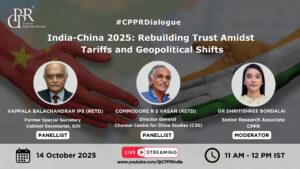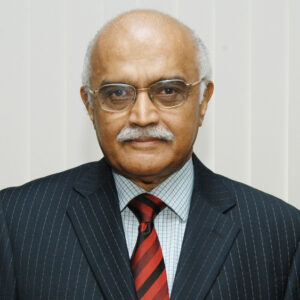India-China 2025: Rebuilding Trust Amidst Tariffs and Geopolitical Shifts

Advancing Learning Outcomes in Education: Equity, Quality, and Innovation | Edupreneur Roundtable at Bengaluru
October 8, 2025
India Rising: Navigating a New Geopolitical Order | Roundtable Discussion
October 16, 2025India-China 2025: Rebuilding Trust Amidst Tariffs and Geopolitical Shifts
| Event Start Date: October 14, 2025 | Event End Date: October 14, 2025 | Event Venue: Zoom / YouTube |

CPPR Dialogue: India—China 2025
As India and China mark 75 years of diplomatic relations on April 1, 2025, their ties embody a complex mix of cooperation and competition. Against the backdrop of US tariffs and broader shifts in the global order, both nations appear to be reviving their dialogue on partnership and mutual interests. The evolving India China 2025 dynamic presents opportunities — but also deep-rooted challenges — in shaping Asia’s future.
Signs of a Thaw Amid Persistent Frictions
Recent months have witnessed subtle indications of a thaw in Sino-India relations, even as strategic tensions remain. Economic frictions continue through regulations on critical minerals, agricultural supplies, high-speed rail equipment, and electronics. Yet, these pressures coexist with diplomatic gestures of engagement — including External Affairs Minister S. Jaishankar’s participation in the Shanghai Cooperation Organisation (SCO) Foreign Ministers’ Meeting, and policy proposals to permit Chinese firms up to 24% stakes in Indian companies without prior clearance.
India has also reinstated tourism visas, direct flights, and border agreements, signaling cautious optimism in bilateral engagement.
Modi’s Visit and the Symbolism of Renewed Dialogue
Prime Minister Narendra Modi’s visit to China on August 31, 2025, for the SCO Summit — his first in seven years — was widely perceived as a symbolic gesture of goodwill.
During the two-day summit, Modi underscored that India and China should act as partners rather than rivals, while President Xi Jinping echoed the sentiment, calling it “the right choice for China and India to be good and neighbourly friends.”
These exchanges and accompanying visuals renewed hopes for greater stability in India–China relations, but the optimism remains tempered by structural and strategic mistrust.
Strategic Balancing in the SCO and BRICS
The SCO itself highlights this dual dynamic. For Beijing, it serves as a platform to project regional leadership, while for New Delhi, it ensures continued engagement in the regional order.
Similarly, India remains cautious about China’s use of BRICS to advance its development agenda and global influence. While bilateral ties improved after the October 2024 border agreement, the absence of Xi Jinping from the Rio Summit prevented a direct meeting with Prime Minister Modi — a missed opportunity to reinforce diplomatic momentum.
Can India and China Build a Sustainable Partnership?
The key question emerging from India China 2025 is whether a genuinely friendly and sustainable partnership between the two nations is feasible.
Despite shared incentives to cooperate — including economic growth, regional stability, and global governance reform — unresolved disputes and competing strategic interests continue to cast doubt on the durability of rapprochement.
Evolving US policies and shifts in global power alignments further complicate this equation. Any normalisation may remain fragile, with India vulnerable to expanding Chinese influence across South Asia and the Indian Ocean Region.
About the Webinar
This CPPR webinar brings together leading experts to explore whether India and China can recalibrate their relationship in 2025, turning dialogue into sustainable frameworks for cooperation. The discussion examines key themes such as economic interdependence, regional competition, border stability, and the implications of global power transitions for Asia.
KEY DISCUSSION POINTS
- How recent border management dialogues and diplomatic exchanges could lay the groundwork for rebuilding trust.
- Do the ongoing US-China trade tensions create opportunities or challenges for India-China trade relations?
- The role of multilateral platforms such as the SCO and BRICS in mediating cooperation amid competition.
- How do both nations balance national security imperatives with the need for regional stability?
- How should India perceive and respond to the strategic directions outlined in China’s grand strategy?
- What proactive measures and strategies should India adopt to safeguard its national interests in light of these developments?
SPEAKERS

Mr Vappala Balachandran IPS (Retd)
Former Special Secretary, Cabinet Secretariat, Govt. Of India
Vappala Balachandran is a Mumbai-based columnist, author, and security & intelligence expert. He retired as Special Secretary, Cabinet Secretariat, Government of India, after serving 17 years in the Maharashtra Police, where he was awarded the Indian Police Medal (1976) and President’s Police Medal (1986).
During his career, he led India’s security review mission to an Indian Ocean country (1987) and interagency counterterrorism dialogues with the U.S. (1993–94). After retirement, he was appointed to the two-member High Level Committee that examined the police response to the 26/11 Mumbai terror attacks, later featured in National Geographic’s Mumbai Massacre.
Mr Balachandran has authored five books, including Keeping India Safe (2017), Intelligence Over Centuries (2022), and India and China at Odds in the Asian Century (2025). In 2024, he became the only Asian profiled in Routledge’s prestigious journal, “Intelligence & National Security” under its ‘Profiles in Intelligence’ series.

Commodore R S Vasan (Retd)
Director General, Chennai Centre for China Studies (C3S); Regional Director (Tamil Nadu), National Maritime Foundation
An alumnus of the Defense Services Staff College, the Naval War College, and the International Visitor Leadership Program, USA, Commodore Seshadri Vasan has a distinguished service of over 34 years in the Navy and the Coast Guard. His appointments include command of warships, two major air stations, and a maritime air squadron. He has participated in both the 1971 war and the IPKF operations.
Prior to retirement, he was the Regional Commander of the Indian Coast Guard Region East, overseeing EEZ Patrol, SAR, Anti-Piracy, Fisheries protection, Maritime Border Control, Marine Pollution Prevention, and other maritime tasks in the Bay of Bengal.
He is presently the Director General of the Chennai Centre of China Studies, the Regional Director (Tamil Nadu) of the National Maritime Foundation. He has been a visiting faculty at the Indian Maritime University, Academy of Maritime Education and Training, Great Lakes Institute of Management, and Hindustan Institute of Engineering Technology. He is on the Board of Advisors at Madras University, Stella Maris College, FPRC, and Puducherry University.
MODERATOR

Dr Dhritishree Bordalai
Senior Research Associate, International Relations, Centre for Public Policy Research (CPPR), Kochi
Dr Dhritishree Bordalai is a Senior Research Associate (International Relations) at the Centre for Public Policy Research (CPPR), Kochi, India. She holds a PhD from the Centre for European Studies (CES), School of International Studies (SIS), Jawaharlal Nehru University (JNU), New Delhi. She completed her MPhil in European Studies from SIS, JNU. Dhritishree has completed her Master’s in Politics with Specialization in International Relations from SIS, JNU. She graduated from St. Stephen’s College, University of Delhi, with History as her key discipline.
She has a Certificate in Public Policy and Management from the Indian Institute of Management, Kozhikode (IIM-K). She has interned at the National Human Rights Commission (NHRC) in New Delhi and was previously working as a Mahatma Gandhi National Fellow under the Ministry of Skill Development and Entrepreneurship (MSDE, GoI).
Dhritishree has been awarded the UGC-DAAD Short-Term Scholarship during her PhD at the Otto-Suhr-Institut für Politikwissenschaft (OSI), Freie Universität Berlin, Germany. She has attended several national and international conferences on her area of research and presented a paper at the Young Researchers Conference in JNU. Her core areas of research are migration, security, and refugee studies.

